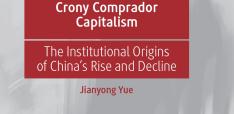An Interview with Sir James D. Wolfensohn (1933-2020)

James D. Wolfensohn, who served as World Bank president from 1995 to 2005, died on 25th November, 2020 at 86. Born in 1933 in Sydney, Australia, Wolfensohn settled in the United States, and as an investment banker, he was no stranger to Wall Street. Wolfensohn’s interests weren’t limited to finance, however. Like his wife, Elaine Wolfensohn, who died just months earlier in August, his passions crisscrossed education, gender equity, and the arts. As an accomplished cellist, moreover, he held leadership positions at such cultural places as Carnegie Hall and the Kennedy Center. And he understood that you couldn’t understand countries ‘just based on a balance sheet analysis.’ Culture, he thought, was the foundation for building trust. At the World Bank, where he was aware that ‘in the view of many’ the organization ‘had gone woefully out of tune,’ yet he felt ‘it was surely the right instrument to play,’ as he put it in his memoir, A Global Life: My Journey Among Rich and Poor, from Sydney to Wall Street to the World Bank: ‘I wanted more humanity in what we were doing, and less of a feeling that we were a bureaucratic machine.’
I interviewed him in 2013 at his firm Wolfensohn & Company in New York for my Fletcher master’s thesis on how to promote Ugandan music as an export in international trade. Our conversation, which has been edited for clarity, is below.
If a country like Uganda had the resources to build a music industry, where should it put these resources?
Well, I think resources, first and foremost, need to be used in terms of economic and social development. And so you want to make sure that there is stability in the country, and that people can eat, and that they can have some hope. But that does not mean that you shouldn’t have along with that a parallel protection of the arts. And I have found that in many countries, having something to turn to which is the essence of what you’ve learned from your parents, and what you’ve seen in the culture, gives a country strength.
The very first place I went to [when I became president of the World Bank] was then the second poorest country in the world, Mali. And the time I saw people laugh and people proud is when they were dancing and when they wanted to show you the arts. So I think that while our priorities are survival, it is very important to have survival with some character of the arts and the culture of the country.
How should developing countries look at intellectual property, (in this case looking at the arts such as music) for development?
Well, the intellectual property is shared. It is not that there is a legal system to see whether people can use , or cannot use intellectual property. It is shared. You don’t have to pay for it. It’s not like in this country [the United States], where there is intellectual property which requires payments. In developing countries particularly, it is a shared resource, and in fact its existence and its development depend on the fact that it is shared, because there is no one sitting on the top saying this is what the culture of this country is going to be. It emerges from the culture. So you want to spread it; you want the kids to know about it; you want the kids to have the chance to taste it, to share it, to feel part of it. And so, in development, to me it was always important that there be something to believe in, something to hope for, and something that connected you with prior generations and would connect you going forward. It’s part of the fabric of life.
Let me expand on that. So — assuming from what I have read, at least relating to music — if some artists are saying, ‘Look, if the government could help us form a collection agency so that when we play our songs on radio, we can get at least some income from that.’
Oh, I don’t object to that if it is their own. If it is their own invention, and if it is part of an emerging industry. I suppose I’m doing a distinction between folk music and the music of the creative artists. And so I’m all in favor of protecting the creative artists and ensuring that they can have some return on what they do. But it is not without difficulty within a lot of the poor developing countries. I mean if their song comes out on the radio in a village 500 miles from the capital, and the kids start playing it, and enjoying it, and you come along and say — ‘well, I really need to get my share of the amount of money that’s due to me on this,’ — it is pretty unlikely that you will get it.
Exactly. But if it has something to do with the artists getting a share …
Yeah … I mean if the artists get a share, and it is [benefiting] the artist, or if it is the artists that are being sold, then you’ve got a chance. If it is just the song detracted from the artist, it is possible, but it is difficult because the thing you need to understand in developing countries is that the organization is not strong even for collecting taxes. So to be fair about it, to collect income from songs is a little difficult. Which is what all your artists find.
If a country, say, Uganda sends musicians abroad, where should they go to perform or form clusters?
Probably the place they should go is where there are Ugandan expatriates first. [This is] because most people have never heard of Uganda, let alone know anything about its culture; they surely don’t know its language, or one of its many languages. Some Africans will know. There is some cohesion of sorts amongst African cultures. But it is very [diverse] as I need hardly tell you. And so if they want to get listened to first, they should probably go and try [to] find a Ugandan community.
On the other hand, there have been examples of people coming to California or other places where the very difference of what people are doing attracts attention. And so, it depends on the transferability of the arts that they are doing. But there is no question that in an artistic sense, whether they will be in London or Paris, or California or New York, there is a willingness to listen to other cultures, more and more . And particularly if there is a substantial black population, for example in New York, they are looking out for things that appeal to them. So it doesn’t have to be just in a Ugandan community.
How should international organizations like the World Bank support creative industries (like music) in developing countries? Does this even matter? If so, Why?
I think it matters because for any developing agency they want to be sure that there is both industrial and economic development, but they also want the country to have its own cultural values and its own cultural development. And I think that the institutions which do not take an interest in that, are not doing their job, and secondly, will not be as well-recognized by the people of those countries. One of the ways they can attract attention, not in a bad way, one of the ways they can build relationships, is by showing an interest in the culture. If you don’t show an interest in the culture of a country, you have very little chance of winning the trust of the people. But I don’t think it should just be a venal activity on the part of some young officer of the bank to say, ‘Oh, I have to do that because it is a way in.’ I think what you need is to have a sensitive relationship between the resident officers and the culture, and what is necessary is that the resident officers and the people who visit, take time to learn about the culture. It is what I was always trying to get my people to do. There is an interdependence between culture and development.
This goes on to connect to the point you had made earlier at a talk at Wellesley College, that the World Bank is not all about financial statements.
It cannot be!
Could you extend on that?
Well, I made the same point I’m making now. I don’t think that you approach different countries just based on a balance sheet analysis, because what is different about them is their culture. And if you are both going to win the confidence of people in the countries and to be able to understand the people of the country; if you’re going to make judgments about the people in the country about whether they trust you or not, what you have to do is to identify them in terms of their culture. And I always found it tremendously important to go and see the local cultures. I [always spent] time before I got down to the business things, going to villages, going to performances, talking to the artists. I never had a reception, cocktail party, or things, just [for] business people. I always brought in the musicians, the artists, because they are part of the fabric of life in a society. And if you came to New York and say the only way to judge New York is by the 100 richest business people, you will be missing out on what really is New York. And I took the same approach in development.
How should the World Bank then support creative industries like music?
I think you have to leave it to your local representatives; I don’t think it is something that you have one central place to deal with. But I think what you should do is to encourage those representatives locally to learn about the cultures, and to support them. I don’t find that difficult at all. I think you should do that. And so, it is basically understanding local cultures and then supporting them as part of the objective of the World Bank. And it has many benefits because it allows you to understand the people in the country, it allows you to establish trusted relationships. But if you come in and say, ‘The only thing I’m interested in is you learning a Beethoven symphony or learning the latest pop song from California,’ there is a difference. What you need to do is to find out what is interesting to the major body of the people in the country. Now with the cellular radio, and everything, what you find in a lot of countries is that the projection of American culture, or French culture, or British culture, is becoming more universal. So the local kids [are all] pretty hip if they understand what’s going on in these places. And so I’m not suggesting that you should divide them all. But [what] I’m suggesting is that in every one of these cultures, there’s a culture of the country. And I think it is tremendously important so that you don’t just have a Hollywood culture around the world, but you have indigenous cultures preserved and valued.
Countries like the United States have the marketing power to do what has been called ‘dumping’ cultural goods across the world. And the WTO liberal trading regime seems to allow that. The push back may be from countries like France and Canada, but what can Uganda do?
One of the things I think Uganda should do, as I think many African countries should do, is to proudly present their cultures. And one of the disappointments to me was that the leadership of many African countries do not themselves support the cultures. They do not project their cultures. They would have a gathering in Washington to raise money for the country, [but] it will never occur to them to have before that some African songs, or bring some kids from school, or to have a dance team, or to do something. They just don’t do it. Because they think it’s too expensive to bring someone over. And maybe if a guy made a hit in Hollywood they will use him. But part of the problem [of] culture, in my opinion, is that the countries themselves do not value it enough. It is not just a crime of the rich countries. It is very easy to blame the rich people for not taking their medicine. But if you don’t present [your culture] proudly, and if you don’t bring over a few young kids, or something they have just done marvelously, or who have some great ideas, or you see them dancing, or if they’ve reached a certain level in your own country and you want to show them off — if you don’t start doing that, then no one knows about them, no one knows that the culture is vital, no one knows about the vibrancy of the country. And that’s a shame. I don’t know whether all the [African] countries have cultural ministers. But if they do, I don’t think they meet together very much to project an African image.
In his book The Economics of Cultural Policy, David Throsby, professor of economics at Macquarie University in Australia, mentions the old adage, ‘Where culture leads, trade follows.’ What do you think about this? Do you have any examples you could share?
Well, I would love to believe that there was [a] direct connection, but I don’t think I do. I think people are buying iron ore in Australia, they are buying it because Australia has a huge quantity of iron ore, and it’s cheap, and it’s well delivered. But I think if they are buying natural resources, or if they are drawing on Australia’s mineral wealth, it would be a tremendous shame if they, at the same time, did not learn about the culture of the country. And I think most of the foreigners that come out there, are finding that the cultural community is trying to get them interested. And there is plenty of opportunity to get the local managers and everything involved in culture in Australia. The culture in Australia is really very rich. A lot of it, however, is the performance of European culture. But there is an indigenous Australian culture, which consists both of aboriginal culture, and also of Australian adaptations of European culture. So Australian painting by young Australian non-aboriginals has a particular character of it. Aboriginal painting has a very, very special character. And all I would say is that there is now a growing wealth in Australia, there is a growing projection of Australian culture. Both the adaptations of European and American culture and the Aboriginal culture.
To add to this idea — sort of Joseph Nye’s soft power — where culture leads, will trade eventually come?
I would like to think that there was a direct connection, but I’m not sure. And I think it is hugely important to protect your activities [so] that people you deal with get to understand you and your culture. But I think basically in minerals and natural resources, the issue is price and capacity to deliver, not culture.
Patrick Kabanda is the author of The Creative Wealth of Nations with a foreword by Amartya Sen. He has consulted for the United Nations Development Programme as well as the Office of the Senior Vice President and Chief Economist at the World Bank.
James D. Wolfensohn KBE AO (1933-2020), author of the memoir A Global Life, was president of the World Bank from 1995 to 2005 and thereafter served for one year as special envoy for Gaza disengagement for the Middle East Quartet. Prior to joining the bank, he established his career as a global investment banker with a parallel involvement in development and environmental issues.


